- Home
- Al Sarrantonio
Halloweenland Page 8
Halloweenland Read online
Page 8
When Dickens didn’t offer, Grant said, “Such as?”
Dickens smiled without showing his teeth. “That would be cheating! And I, an impresario, am no cheater!”
Grant said nothing.
“Have you seen quite enough?” Dickens asked, his tone not encouraging Grant to say, “No.”
“I suppose so,” Grant said, conceding the dismissal. “But let me ask you: will you really be ready for Halloween?”
Dickens threw his head back and barked a laugh. Again the slightest look at those tiny white pointed teeth.
“I should say so! I have excellent help. I hope to see you here then, yes?”
Grant locked eyes with the strange little man for the briefest moment, before nodding.
“Perhaps.”
“Good. Until then.”
Dickens bowed curtly and then put out his hand, which Grant felt obliged to take. It was moist, as he had feared—like the flipper of a seal.
Dickens removed his hand as abruptly as he had offered it, and turned and walked away, his steps short and precise.
“Auf Wiedersehen, Detective Grant!” Dickens called, without turning around.
Grant thought he heard the tiniest of chuckles.
The door to the trailer opened, closed.
There was the click of a lock.
After a moment, Grant turned and walked back to his car.
His thoughts were not on the moist handshake or the mocking laugh, or even on the bizarre appearance of the carnival impresario.
Grant thought instead: How did he know my name, if he didn’t look at my badge?
CHAPTER TWENTY-NINE
Three hours and twenty minutes later found Grant in front of the rectory door of St. Bart’s Church in Newton, Massachusetts. Behind it he heard the unmistakable sound of a televised football game. As he rang the bell the sound disappeared, and there was the sound of a shuffling gait approaching the door.
It opened, and Grant blinked—the man facing him was much older than he had sounded on the phone.
He was also obviously blind.
“Detective Grant, I presume?” the priest said, putting out his right hand.
Grant shook it. “Thank you for seeing me, Father.”
“Was that a blindness pun, Detective?”
For the first time in a long time, Grant found himself momentarily flustered, but his unease was immediately dispelled by the priest’s booming artificial laugh. There was definitely something wrong here. “If you can’t make fun of a disability, why have it?” Coughlin said. His continued handshake drew Grant into a short hallway past a set of stairs and into a room. “I have some excellent scotch waiting to be done away with,” he said.
“How did you know—”
The priest stopped, turned with a cocked eyebrow. “Hmm? Oh, I didn’t know you like scotch. But I do.” He turned and continued to shuffle. “If you like it, too, so much the less for me.”
The room was tidy and small, and still managed to make Grant’s hotel room look like a closet. And a dirty one, at that. It was well furnished and cozy, warm and inviting. Too warm, in fact. Grant took off his coat.
“Make yourself comfortable, Detective,” the priest said. He was easing himself into one of two very comfortable-looking side chairs angled half toward one another and half toward an old nineteen-inch black-and-white television.
“You’re staring at the television, no doubt,” Coughlin said, reading the silence. “There’s no remote, and only those huge dials to change channels, so I’m afraid you’ll have to get up to turn down the sound when we get well into it. No color televison for this blind priest, not from this diocese. Not from any diocese, these days, I’m afraid. No cable, either, so we’ll have to put up with the Patriots and the Jets. You’re a Jets fan, I suppose, being from New York?”
Before Grant could speak the priest cut in: “But of course, you said yesterday that you’re a baseball fan. Mets?”
“Yankees.”
“Would you pour, Detective? I certainly know how, but things will go more quickly this way.”
Grant turned his attention to the tray set on an ottoman between them, laid out with a bottle of Johnnie Walker red and two glasses. He made a slight sour face at seeing the Johnnie red.
“Since you are a scotch man, are you a Johnnie Walker man?” the priest asked brightly.
“Absolutely,” Grant fibbed.
“No, Dewar’s, I’d say. I could smell it about you when you came in.”
Grant laughed shortly. “Got me there, Father.”
“It’s an old trick from the confession box. Lean in close and smell the breath.”
Though everything the priest said was homey and warm, there was still something wrong in the air. Grant’s weird-shit detector was firing on all cylinders. It was like the priest was in some sort of trance.
Something’s wrong here, he thought.
He poured, handed one glass over to the priest and drank off a bit of his own.
It was warm in his throat, in the warm room, and down into his belly.
“First drink of the day, if you don’t mind my asking?” Coughlin asked, chuckling to himself.
“You watch a lot of detective shows on television, Father?”
“Another pun? Watch?”
Grant was getting a little tired of the routine. What seemed just jocularity was instead a man talking a mile a minute so he didn’t have to get where he had to. It usually happened with a man who wasn’t intrinsically criminal but somehow found himself mixed up, after perhaps a lifetime of straight arrow law abiding, in something nasty and illegal.
No, it wasn’t that: it was like looking at a man who was waking up from a nightmare.
The priest was sipping his scotch, his hand shaking ever so slightly.
“What I was telling my housekeeper just the other day—”
Grant reached out and flicked off the television set.
“And it sounded like the Pats were about to score a field goal—” the priest started, almost sadly.
“Time to talk, Father Coughlin. And no bullshit. I came over here because you wanted to talk face-to-face. I take it there was a reason you didn’t want to talk on the phone. Correct?”
The priest nodded, and put down his glass. Grant noted that it was empty. He emptied his own and poured more scotch into each.
“Very sad. It was Mrs. Finch, the housekeeper. When she’s here she listens in on the extension, nothing I can do about it. That’s why I was so coy with you on the phone yesterday. I’m afraid even that was too much, as you will see.”
“What does that mean?” Grant asked.
“Please let me tell my story in my own way. I know this is about the girl, Anna.”
Grant’s pulse quickened. He watched as the priest brought his glass up, hand shaking more noticeably, and drained it in a single swallow. As he lowered it Grant moved to fill it again but the priest shook his head. “No more now. It would cloud my thoughts. Later, perhaps. Oh, yes, much more of it later.”
“As you like.” Grant topped his own drink and put the bottle aside.
Father Couglin stared hard at something only he could see. His brow furrowed. “This all seems so much clearer to me now that it’s over, in a sense. It all happened in a rush, and of course there’s Christian charity to account for. I’m sure now that I was chosen because I was blind. She must be truly hideous to behold.” The blind eyes turned toward Grant. “Did you know that the blind can often feel the way something looks? It’s like heat from the sun, or call it intuition.
“She was brought to the rectory five years ago by someone who gave off the opposite of heat, Detective. I don’t know how quite to explain this to you, but it was as if winter had stepped into the hallway, and it was the middle of Indian summer. Early November. A beautiful day, too, but even the smell of late blooming flowers, the smell of the warmth itself—all of it went away in an instant, snuffed out and replaced by . . .” he waved an arm “. . . blank, odorless
cold.”
“I know what you mean, Father.”
“Do you?” The priest’s face showed surprise.
Grant was silent.
The priest fumbled for his glass. “I believe I will have a little more of that scotch, Detective. This is all so strange. Like I’m slowly waking from a dream.”
Grant dutifully filled the glass and watched the priest drink.
“Please continue,” Grant said.
The priest stared into space again, concentrating. “He didn’t stay long, this . . . cold thing. He said his name was Samhain. But he put the child into our care, and extracted a vow that nothing would be said for five years. No one was to know. This puzzled me then, and it puzzles me now, except for the fact that when Mrs. Finch saw the child later she nearly fainted. I still remember her saying, ‘Saints in heaven!’ and I know she crossed herself because she told me of it later. But she also said that a child is a child and that we would do as I had vowed. I know now that the cold fellow came to the rectory when she was out doing errands because she never would have stood the sight of him, and his plan would have gone awry. He was very clever.”
Grant waited while the priest drank again.
“I still don’t know how he extracted a vow from me. This is not something a priest would normally do. Paperwork, and the diocese, and so on. Not to mention the state. But once I had made that vow . . .” He shrugged.
“This . . . Samhain was very persuasive.”
The priest nodded, then leaned back and shrugged. “More than that. Like I said, it’s like the last five years were a sort of fugue. And that’s much of my story. Mrs. Finch and her husband raised the child, good people that they are—or were, I should say. For they changed as the baby grew. At first Mrs. Finch would mutter and pray and talk about the child’s ugliness and unnaturalness, but then, over time these complaints lessened, until they became endearments. And this puzzled me greatly, because I felt nothing from the child. As I told you, the blind can sometimes see with their other senses—but from this child I got nothing. No cold, or warmth, nothing at all. Like a blank slate. I ran my fingers lightly over her face once, when I thought she was asleep, and I had the oddest feeling that I was touching just that—a blank slate.
“They named her Anna, though I thought the name was not right. I could think of none that would be right. Does that make sense? And they kept her in the back bedroom and let her play—though I don’t know if I would call it that—in the attic room and the hedged backyard. And no one outside of this little house ever knew she existed. Samhain was often about, though he never spoke to me again.”
“Where is she now, Father?” Grant said quietly. The blood was pounding through his veins.
The priest looked distracted, then reached for his scotch. When he had finished with it he said, shaking his head, “This is all so strange. Like waking from a dream. All of it, from beginning to end, from the day that cold fellow arrived until now, this exact moment. As it was happening I knew it was unnatural, and perhaps even wrong, but I told myself that a vow was a vow. But of course it isn’t, not if it’s wrong. Even putting that television on before you came here was part of my dream, Detective. Do you understand?”
“I’m afraid I don’t,” Grant said. There was a slight edge in his voice, and he felt like reaching for his holstered .38, which, like his spare badge, he had not turned in to Captain Farrow.
“Where is the girl, Father?” he said, slowly getting up. He could feel the tension in the room, even though he knew it emanated from himself.
The priest looked up at him, and there was a tear tracking his cheek from his blind right eye. “What have I done, Detective? What great evil have I helped perpetuate? That cold creature was always about, and the police have already been here about the poor little girl Beatrice who was murdered, and the Lincoln is gone. I’m afraid the diocese will be very upset . . .”
“I don’t know what you’re talking about, Father.”
“I’m afraid the police will be back.” Coughlin put his head in his hands and began to weep.
Grant edged away from the chair, drawing his .38, looking out into the hallway.
“Anna should never have been here.” The priest looked up, and his face was awash in tears. “I’m a priest! A man of God! And that thing was in my care for five years! Oh, I was asleep . . .”
Grant backed into the hallway and quickly mounted the creaking stairs. There was a landing with two doors, and he opened one, a storage room, and then another, a girl’s bedroom.
He went in. There was a bed, made up with white starched tucked sheets and a light pink summer blanket. A doll that looked untouched and new was propped against the foot of the bed. The walls were bare. There was an oval rag rug on the floor and nothing else. No toys, no keepsakes. The closet was open and empty.
Grant backed out of the room and slowly mounted the steps to the attic. He could hear the priest moaning and sobbing below. There was a stained wooden door with a glass ovoid handle. He turned it with his left hand, feeling the coolness of the glass, and pushed it open, aiming the .38 in his right hand into the room.
Two skylight windows sent sharp shafts of light that fell on the floor like painted distorted yellow rectangles. There were two bodies, half in the light and half in shadow. A man and a woman, older. Sensible shoes. There were no visible wounds, but they were cold as potato salad. There was a note under the woman’s head.
Grant pulled on a pair of latex gloves from his pocket, just so that the local police wouldn’t find his prints on anything later, and picked up the note, angling it into a shaft of overhead sunlight. He read it:
HOPE YOU ENJOYED THE PADRE. LONG TIME NO SEE. HAVE GONE HOME, DON’T FOLLOW. S.
Samhain.
Grant carefully folded the note and put it in his pocket.
Don’t follow? the note warned.
“My ass,” Grant said, out loud.
CHAPTER THIRTY
The car drove itself, which was good. There was precious little else she could do without Samhain around. Which annoyed her greatly, because she had thought her powers would be greater in this world. She had discovered, at the age of three, that she could kill—on a warm summer afternoon, as she sat in the shade of an elm tree in the tiny, secluded backyard of the rectory, a butterfly had alighted on her bare arm. She was still amazed by the flesh that enclosed her, baby pink and smooth and nearly flawless (there was a tiny mole in the curve of skin between her thumb and left forefinger, which she had not been able to wish away), and only her hair, which was unnaturally white blond, and which the fool humans who had taken care of her had cut in short bangs to minimize its effect, and the deep empty pools of her gray eyes, identified her as anything other than of the human race.
To the butterfly: she was sitting still as stone in a webbed folding chair, feeling the warmth and slight waft of breeze which brought flower and tree odors to her, when the insect, a beautiful monarch of bright orange and black, had settled on her motionless arm. She looked down at it. It moved its wings up, down, up, down as if completely oblivious of her presence. A cloud blotted the sun, and the neatly mowed square of backyard was plunged into sudden shadow. She looked up; through the sway of elm leaves she saw a single fat white cloud moving leisurely from west to east; already the bright fringes of the sun was showing at its trailing edges. The cloud looked vaguely like a rabbit, crouched and ready to eat.
She looked back down at her arm. The butterfly had ceased the beating of its wings and looked asleep. Could a butterfly be content? This one appeared so.
The sun burst out of its cloud cover and a shaft of light fell on the butterfly, making it radiant. As if startled from slumber it took flight, turning for a moment toward the girl, who stared at it while reaching out a tentative finger.
The butterfly brushed the finger with one wing, and fell to the ground motionless.
The girl looked at it for a moment and then closed her eyes and let the afternoon wash over her.
She met the other little girl quite by accident. Sometimes she got in the black Lincoln and rode, just to get out of the rectory and away from Mr. and Mrs. Finch, the minder humans, and sometimes just to vex Samhain. She liked to do that. Though lately he seemed more distant, less his old self, less prone to jest. Sometimes she wondered about that.
The car was spacious in the back, all windows clouded by tinted glass, and it went where she willed it to. She had taken jaunts into Boston, to see what a city was like up close; but it was noisy and crowded and filled with too much antlike activity and mindless motion. And, they had gotten lost in the maze of one-way streets, until Anna had willed, Just go home. That had been close to exhausting, and she hadn’t tried it again—though it did provoke an amusing tirade of invectives from Samhain, along the lines of “What if—”
“But it didn’t happen, Samhain. We didn’t get stranded, or run into a parked car, or stopped by a policeman, or set upon by hooligans.”
“But what if—!” Samhain had persisted, and then Anna had laughed in his face and told him to stop.
Which made her almost sorry for him, because he had gone into one of his funks, then, all the spunk gone from him.
So the car trips had become more localized—to a shopping mall parking lot, to watch the humans frantically purchase; to the county jail, to watch the faces going in and coming out, and playing a guessing game of who was judge, who was lawyer, who was prisoner; to the park, to watch the humans at play.
Which was where, on a warm autumn day, she saw the other little girl.
The town park was a huge flat square plot of land, with a baseball diamond at one end, a soccer field at the other, basketball courts in the middle to one side, and the other left to no sport save leisure. This was the area closest to the parking lot. There were picnic benches, and metal barbecue grills permanently mounted next to them and an abundance of trees that reminded Anna of the rectory backyard. She was tempted to leave the Lincoln, but decided to heed Samhain’s warnings about interacting with humans—until she saw something that almost startled her. A little girl, nearly her mirror image, was sitting under an oak tree alone, acting in the most curious way. She sat quietly for a few moments, then suddenly pushed herself off the ground and ran this way and that, then threw herself on the ground. Then she slowly rose and quietly returned to her original spot.

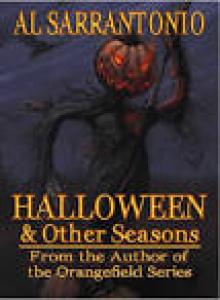 Five World Saga 01 Hornets and Others
Five World Saga 01 Hornets and Others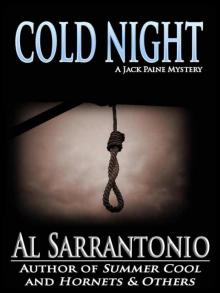 Cold Night (Jack Paine Mysteries)
Cold Night (Jack Paine Mysteries)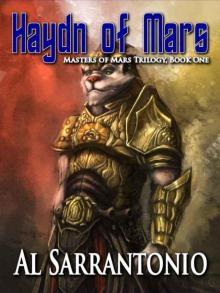 Haydn of Mars
Haydn of Mars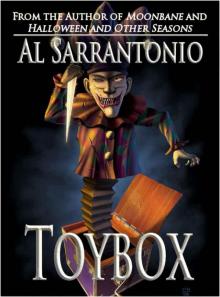 Toybox
Toybox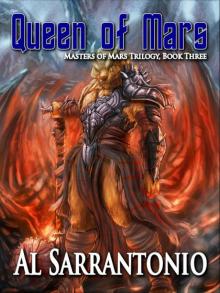 Queen of Mars - Book III in the Masters of Mars Trilogy
Queen of Mars - Book III in the Masters of Mars Trilogy Exile
Exile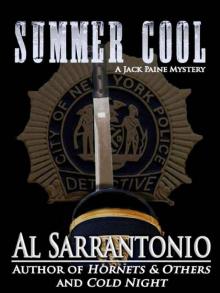 Summer Cool - A Jack Paine Mystery (Jack Paine Mysteries)
Summer Cool - A Jack Paine Mystery (Jack Paine Mysteries) Return - Book III of the Five Worlds Trilogy
Return - Book III of the Five Worlds Trilogy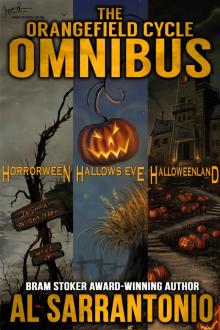 The Orangefield Cycle Omnibus
The Orangefield Cycle Omnibus Summer Cool jp-2
Summer Cool jp-2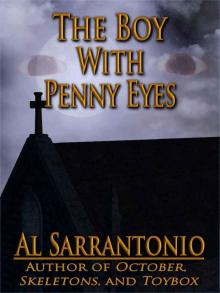 The Boy With Penny Eyes
The Boy With Penny Eyes Journey - Book II of the Five Worlds Trilogy
Journey - Book II of the Five Worlds Trilogy Kitt Peak
Kitt Peak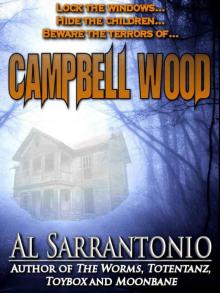 Campbell Wood
Campbell Wood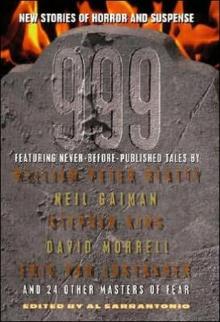 999
999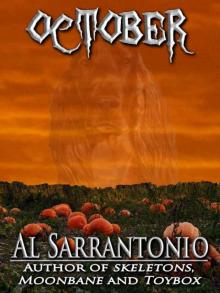 October
October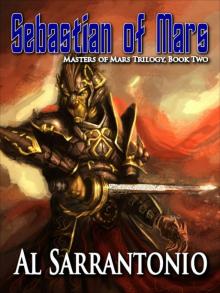 Sebastian of Mars
Sebastian of Mars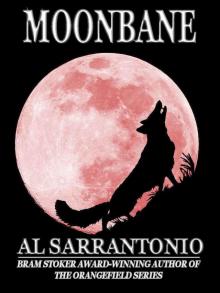 Moonbane
Moonbane Totentanz
Totentanz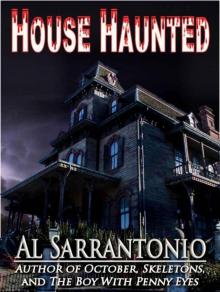 House Haunted
House Haunted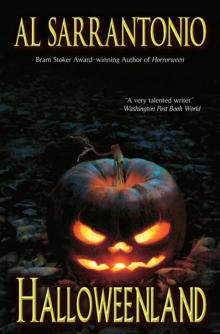 Halloweenland
Halloweenland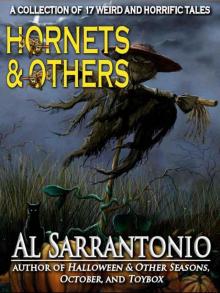 Hornets and Others
Hornets and Others